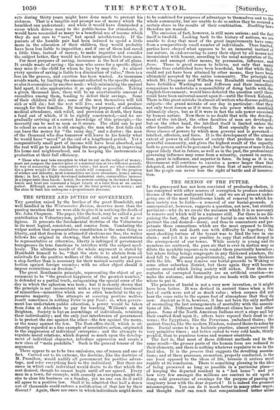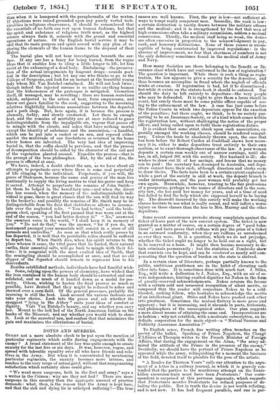THE SEXTON OF THE FUTURE. URE.
IF the graveyard has not been convicted of producing cholera, it has conspired with other sources of corruption to produce endemic disease of the most malignant kind and we are at present, under- going one of the most troublesome kinds of removal to which hu- man society can be liableāa removal of our burial-grounds. A correspondent, however, suggests a question, not new, but strictly pertinentāwhy do we create the nuisance which it is so necessary to remove and which will be a nuisance still. For there is no dis- guising the fact, that the practice of burial is one which tends to protract the end desiredādecay, and thus to concentrate and 'per- petuate those emanations which are the most opposed to living existence. Life and death can with difficulty be together; the most shocking torture of the tyrant was to bmd the two in one chain ; and yet it is our practice to copy that refined despot in the arrangement of our towns. While society is young and its members are scattered, the pure air that is ever in motion may so dilute the mephitic vapours as to render them practically harmless; but where living beings congregate in any thickened numbers, the dead fall to the ground proportionately, and the poison thickens with the life. We may remove our burial-grounds to Woking or some other suburban district, but there again they will become centres around which living society will sicken. Now these re- ceptacles of corrupted humanity are an artificial creationāwe make the nuisance, and then perplex our heads with the question where to put it. The practice of burial is not a very new invention, or it might have been better. It was devised in ancient times when a few feet of earth were not of so Much value ; when corpses did not bear the same ratio to the square foot of atmosphere that they do now. Ancient as it is, however, it has not been the only method of reconciling the last arrangements of mortality with the associa- tions of life. Different times and different climes have had other plans. Some of the North American Indians erect a stage and lay their exalted dead upon it; others have reposed their dead in ca- verns; the Egyptians, like the Peruvians, embalmed theirs; the ancient Greeks, like the modern Hindoos, reduced theirs to ashes by fire. Burial seems to be a barbaric practice, almost universal in very primitive times ; and better suited to -very cold lands, thinly peopled, than to populous towns and warmerconntries. The fact is, that most of these different methods and in the same resultāthe grosser parts of the human form are reduced to their elements, and there is nothing whatever repulsive to us in the final idea. It is the process that suggests the revolting associa- tions ; and of these processes, cremation, properly conducted, is the one least opposed to the ideas of life, because it arrives most rapidly at its conclusion. There is something pleasing in the idea of being preserved as long as possible in a particular placeā of keeping the departed resident in a " last home ": and yet how very few amongst the millions are content to sit upon a damp cold gravestone of evenings for the purpose of passing an imaginary hour with the dear departed ! It is indeed the grossest misconception. You can do it much better in manrother_ways; and thought itself can reach that eompanionhood better alone than when it is hampered with the paraphernalia of the sexton. If objections were raised grounded upon any purely verbal tech- nicalities in religious observances, it should be remembered that the essentials of no faith can rest upon human fashions, but that the spirit and substance of religious truth must, as the highest science always finds it, coincide with the grand and essential operations of nature. Of the English burial service it may be said that its main purpose and spirit accord with any plan of re- storing the elements of the human frame to the disposal of their Maker.
The burial plan will not bear investigation beneath the sur- face. If any one has a fancy for being buried, from the vague ideas that it enables him to cling a little longer to life, let him assist at the exhuming of a dead body. Embalmingāthe preserva- tion of the actual integuments by 'fragrant drugsāsounds poet- ical in the description ; but let any one who thinks so go to the College of Surgeons, and look for an instant at the beautiful young lady whom Mr. Van Butchel embalmed. He will not look twice ; though indeed the injected carcase is so unlike anything human that the hideousness of the grotesque is mitigated. Cremation itself, ill managed, may be revolting : there are human secretions which, subjected to the action of heat, form empyreuma, and throw out gases familiar to the cook, suggesting to the mourning relatives frightfully ludicrous associations between the departed and a pork chop. But, here again, it is because the process is clumsily, feebly, and slowly conducted. Let there be enough heat, and the remains of mortality are at once reduced to gases indistinguishable from the impalpable air, vapour that passes off to mingle with the clouds, and ashes that have nothing mortal except the identity of substance and the association,āa handful, which can be. put into a casket or an urn, and reposed either amidst the multitude of our forefathers or retained in the home where homes are inherited. The very last idea of improving burial is, that the coffin should be pervious, and that the process of decomposition should be aided by the character of the soil and of the vegetation planted around. Expedite the processāthat is the precept of the true philosopher. But, by the aid of fire, the process is effected at once.
We have, indeed, a doubt about the urn, as we have about all attempts to perpetuate save where there is some real perpetuity of life clinging to the individual. Perpetuate, if you will, the grave of Shakspere, because the name and genius of the man live continually to supply the living motive to tend his grave and keep it sacred. Attempt to perpetuate the remains of John Smithā let them be lodged in the hereditary urnāand when the direct line has ceased, when the memory of the indistinguishable indi- vidual is gone, there is great chance that the urn will find its way to the broker's; and possibly the remains of Mr. Smith may be in- distinguishable from the dust that sluttishness allows to accumu- late over the neglected relic. " You had better," said the bride- groom elect, speaking of the first parasol that was worn out at the end of the season, " you had better destroy it." " No," answered the sweetest voice in the world, " I shall keep it in memory of you." " Do not do that," was the answer, " for if you do, my monument amongst your memorials will consist in a store of old parasols and umbrellas." As soon as that which really passes by has departed, it is well that its perishable relics should be suffered to depart too. When Smith dies, when his spirit returns to the place whence it came, the vital gases that lie buried, their natural earths, their essential salts, will go back to mingle with their fel- loWs : it is congenial with the most exalted idea of Smith, that the remingling should be accomplished at once, and that no old slipper of the tlepaited should remain to represent him to his descendants.
Besides established methods, individuals have had fanciful wish- es. Some, relying upon.the powers of chemistry, have wished that the iron contained in the human body should be extracted and con- solidated, and so much of it handed down as a medal for pos- terity. Others, wishing to hasten the final process as much as possible, have desired that they might be reduced to ashes and strewed over a corn-field. Of the general processes, probably the inurning is still the best. Look around the various fashions and take your choice. Look into the grave and ask whether the snuggest " lying in the Abbey " snits your ideas of comfort or dignity. Visit Van 13utchel's beauty, and say whether you envy 'her. Mount to the last bed of the North American Indian on the banks of the Missouri, and say whether you would wish to share it. Look at the ancestral hrn, and confess that that minimizes the pain and maximizes the alleyiations of burial.



































 Previous page
Previous page